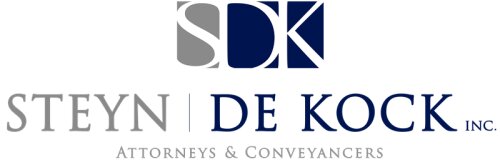Best Child Abuse Lawyers in Welkom
Share your needs with us, get contacted by law firms.
Free. Takes 2 min.
Free Guide to Hiring a Family Lawyer
List of the best lawyers in Welkom, South Africa
About Child Abuse Law in Welkom, South Africa
Child abuse is a serious concern in Welkom, South Africa, as it is in many communities around the world. Child abuse refers to any action by parents, caregivers, or others that results in harm, potential harm, or the threat of harm to a child. This can include physical, emotional, or sexual abuse, as well as neglect. South African law, in alignment with international standards, sets strict guidelines to protect children from all forms of maltreatment, neglect, abuse, or degradation. In Welkom, both governmental agencies and non-governmental organizations work to protect children and provide support to affected families.
Why You May Need a Lawyer
There are many situations related to child abuse where legal assistance may be essential. Common reasons include:
- Reporting suspected or confirmed cases of child abuse and ensuring they are properly handled by authorities.
- Dealing with allegations of abuse, whether you are the accused or the complainant.
- Navigating custody disputes where one parent accuses another of abuse or neglect.
- Ensuring the protection of abused children through legal intervention, such as obtaining protection orders.
- Adopting a child or fostering and needing to understand your legal responsibilities for their protection.
- Seeking criminal prosecution of offenders or defending yourself against charges of abuse.
- Pursuing compensation or civil remedies for harm suffered by a child due to abuse.
A lawyer helps you understand your rights, assists with the necessary legal processes, and can act as your advocate in complex situations.
Local Laws Overview
South Africa has comprehensive laws addressing child abuse, with the Children’s Act 38 of 2005 being the cornerstone legislation. In Welkom, which falls under the Free State Province, local courts and welfare entities enforce these national laws alongside local policies. Key aspects include:
- Mandatory reporting: Any person who suspects child abuse is legally required to report it to police, social workers, or designated child protection organizations.
- Definitions of abuse: Abuse includes physical, sexual, emotional harm, or neglect.
- Immediate removal: If a child is found to be in immediate danger, authorities can remove them from the harmful environment.
- Court protections: The Children’s Court can issue orders for care, supervision, or removal of children and impose obligations on parents.
- Criminal penalties: Offenders can face significant fines or imprisonment for violations involving child abuse.
- Confidentiality: The identity of child victims is protected in all legal proceedings.
- Children’s rights: The Constitution and Children’s Act emphasize the right of every child to be protected from maltreatment and to have their best interests considered in all decisions affecting them.
Frequently Asked Questions
What is considered child abuse under South African law?
Child abuse includes physical, emotional, or sexual harm to a child as well as neglect (failing to provide necessary care, supervision, or necessities). All these forms are recognized under the Children’s Act.
Who is required to report child abuse in Welkom?
Any person who suspects a child is abused or neglected is required by law to report it to a police official, social worker, or a designated child protection organization. Professionals like teachers and doctors are under particular legal obligation to report.
What happens after I report a case of child abuse?
Authorities such as the police or a social worker will investigate the report. If the child is in immediate danger, steps will be taken to ensure their safety. The case may be referred to the Children’s Court for further action.
Can I remain anonymous when reporting child abuse?
You can request anonymity when making a report, especially if you fear for your safety. However, authorities may contact you for further information if necessary.
What protections are available for abused children?
Preventive removals, temporary foster care, protection orders, counseling, and ongoing social support services can be put in place through the courts and social services.
Are there penalties for failing to report known child abuse?
Yes. South African law makes it an offense to fail to report suspected child abuse, especially for professionals working with children.
What should I do if I am falsely accused of child abuse?
Contact a qualified lawyer immediately. Gather documentation and witnesses in your favor, and refrain from confronting the accuser or the child.
Can child victims testify in court?
Yes, but special procedures are used to protect them from further trauma, such as closed courtrooms and support from social workers.
How does child abuse impact custody decisions?
Allegations or evidence of abuse can greatly affect custody and access arrangements, with the court prioritizing the child’s safety and wellbeing.
How long do child abuse cases typically take to resolve?
It varies greatly depending on circumstances, but urgent applications for protection are dealt with swiftly. Full investigations and court proceedings can take months.
Additional Resources
If you or someone you know is affected by child abuse in Welkom, several organizations and governmental bodies can provide support, information, or legal intervention:
- Department of Social Development (Welkom regional offices)
- South African Police Service (Child Protection Unit)
- Childline South Africa (provides a 24-hour helpline and counseling services)
- Free State Department of Health (for medical examinations and care)
- Children’s Court (Welkom Magistrates’ Court for applications and hearings)
- Non-profit organizations like Teddy Bear Clinic and local shelters for abused children
These resources can guide you on reporting procedures, legal rights, counseling, and protective services for children.
Next Steps
If you require legal assistance with a child abuse matter in Welkom:
- If a child is in immediate danger, contact the police or social services right away.
- For ongoing concerns or legal proceedings, consult a qualified lawyer specializing in family or child protection law.
- Collect any documentation or evidence related to your case, such as medical reports, photos, or messages.
- Prepare a detailed statement of events and keep a record of all relevant communications.
- Reach out to support organizations or hotlines for guidance and emotional support.
- If needed, ask the court or your lawyer about protection orders or further court applications for the child’s safety.
Remember, acting quickly and using both legal and community resources will help ensure the safety and well-being of affected children.
Lawzana helps you find the best lawyers and law firms in Welkom through a curated and pre-screened list of qualified legal professionals. Our platform offers rankings and detailed profiles of attorneys and law firms, allowing you to compare based on practice areas, including Child Abuse, experience, and client feedback.
Each profile includes a description of the firm's areas of practice, client reviews, team members and partners, year of establishment, spoken languages, office locations, contact information, social media presence, and any published articles or resources. Most firms on our platform speak English and are experienced in both local and international legal matters.
Get a quote from top-rated law firms in Welkom, South Africa — quickly, securely, and without unnecessary hassle.
Disclaimer:
The information provided on this page is for general informational purposes only and does not constitute legal advice. While we strive to ensure the accuracy and relevance of the content, legal information may change over time, and interpretations of the law can vary. You should always consult with a qualified legal professional for advice specific to your situation.
We disclaim all liability for actions taken or not taken based on the content of this page. If you believe any information is incorrect or outdated, please contact us, and we will review and update it where appropriate.









